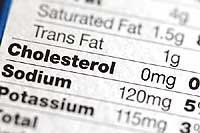What You Need to Know About Sodium

While most Americans do not get enough of many vitamins and minerals, sodium is one substance most people get too much of. While it is possible to be deficient in sodium, such deficiencies are incredibly rare, and for most people the problem is too much sodium.
Sodium is of course important to the proper functioning of the body, and every diet needs to contain enough of this important mineral. Fortunately, virtually every food contains sodium, and it is almost impossible to not get enough sodium in the average diet.
Excess sodium levels, on the other hand, can cause plenty of problems. Excess consumption of sodium has been shown to play a role in such serious conditions as high blood pressure and heart disease, and excess sodium can lead to weight gain and water retention as well.
Dietary Sources of Sodium:
Sodium exists in virtually every food, and a balanced diet will contain plenty of sodium.
Recommended Daily Dosage of Sodium:
The minimum recommended daily intake of sodium is 2.4 grams, and most people will have little problem meeting that goal. Those who suffer from high blood pressure, and those who are prone to heart disease, should exercise caution and decrease their sodium intake to as low a level as possible.
Sodium Supplements:
Sodium would rarely if ever be needed as a supplement, but it is part of some multivitamins.
Side Effects and Toxicity of Sodium:
The most serious and well-documented effects of excess sodium in the diet are high blood pressure and heart disease. Anyone who is prone to heart disease or high blood pressure should use caution when eating sodium rich foods.
Symptoms of Sodium Deficiency:
Sodium deficiency is quite rare, due to the high levels of sodium in the modern diet. However, symptoms of a sodium deficient diet can include nausea, vomiting, diarrhea, sweating, and muscle weakness.
|